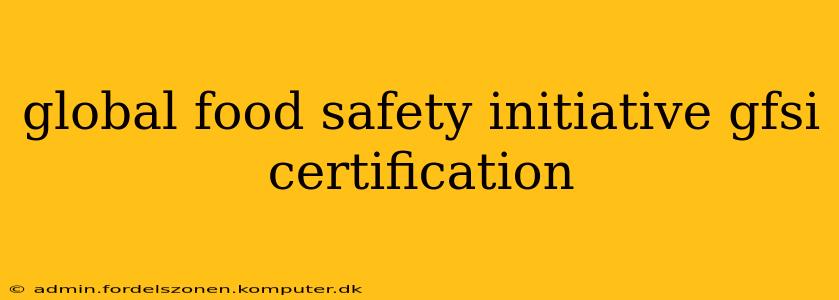The Global Food Safety Initiative (GFSI) isn't a certification body itself, but a collaborative platform bringing together leading food safety experts, retailers, manufacturers, and other stakeholders. Its primary goal is to harmonize food safety standards worldwide, reducing the need for multiple audits and streamlining the process for food businesses. This means achieving GFSI certification isn't a single certification but rather recognition that a business meets the stringent requirements of a GFSI-benchmarked scheme. This post will delve into the intricacies of GFSI, explaining its importance and answering common questions.
What is GFSI Certification?
GFSI certification signifies that a food business adheres to internationally recognized food safety standards. It's not a certification in itself, but rather a benchmark that various certification bodies use to ensure their programs meet a high level of quality and consistency. By achieving certification under a GFSI-recognized scheme, businesses demonstrate their commitment to producing safe food products and complying with best practices across the entire supply chain. This builds trust with consumers and facilitates trade globally.
What are the Benefits of GFSI Certification?
The advantages of achieving certification under a GFSI-recognized scheme are numerous and impactful:
- Enhanced Consumer Confidence: Certification shows your customers you prioritize food safety, building trust and brand loyalty.
- Improved Supplier Relationships: It streamlines audits and simplifies interactions with retailers who require GFSI-recognized certification.
- Access to New Markets: Certification opens doors to international markets with stricter food safety regulations.
- Reduced Audit Costs: Instead of multiple audits for different retailers, a single GFSI-benchmarked audit often suffices.
- Improved Operational Efficiency: Implementing a robust food safety management system improves overall efficiency and reduces waste.
- Competitive Advantage: GFSI certification is a significant differentiator in a competitive marketplace.
Which GFSI-Benchmarked Schemes are Available?
Several reputable certification bodies offer GFSI-benchmarked schemes. These schemes are regularly reviewed and updated by GFSI to maintain alignment with evolving food safety best practices. Some popular examples include:
- BRCGS (British Retail Consortium Global Standards): Widely recognized, especially in the UK and Europe.
- IFS (International Featured Standards): Popular in Europe and increasingly adopted globally.
- SQF (Safe Quality Food): A widely adopted standard in North America and beyond.
- FSSC 22000 (Food Safety System Certification 22000): Based on ISO 22000 and recognized worldwide.
- GlobalG.A.P.: Focuses on Good Agricultural Practices and is crucial for agricultural producers.
It's essential to research and choose a scheme appropriate to your specific business type, products, and target markets.
How to Achieve GFSI Certification?
The process generally involves:
- Selecting a GFSI-Benchmarked Scheme: Choose the scheme most suitable for your operations.
- Gap Analysis: Assess your current food safety practices to identify areas needing improvement.
- Implementation: Implement the chosen scheme's requirements throughout your organization.
- Internal Audit: Conduct internal audits to verify your compliance.
- Certification Audit: A certified auditor from an accredited body will perform an audit.
- Certification: Upon successful completion of the audit, you'll receive your GFSI-recognized certification.
- Maintenance: Regular audits and ongoing compliance are required to maintain certification.
What are the Key Differences Between GFSI-Recognized Schemes?
While all GFSI-recognized schemes aim for similar outcomes, subtle differences exist in their scope, requirements, and emphasis. For example, some schemes may focus more on specific product categories or manufacturing processes. A thorough comparison is crucial before selecting a scheme. Consult the GFSI website and the individual scheme providers for detailed information.
What is the Cost of GFSI Certification?
The cost varies significantly depending on several factors, including the chosen scheme, the size and complexity of your business, and the certification body. It's best to obtain quotes from several certification bodies before making a decision.
How Long Does it Take to Get GFSI Certification?
The timeframe depends on the business's preparation, the chosen scheme, and the auditor's availability. However, expect a process spanning several months, from initial gap analysis to final certification.
By understanding the complexities and benefits of GFSI certification, businesses can significantly enhance their food safety systems and gain a competitive edge in the global marketplace. Remember to consult with experienced professionals to guide you through the certification process.
